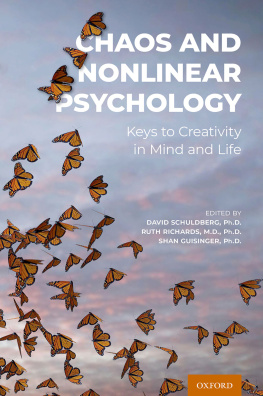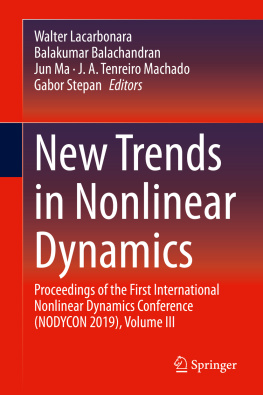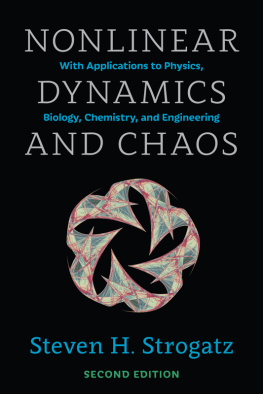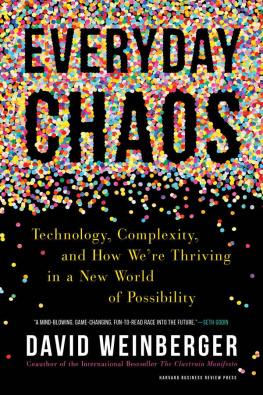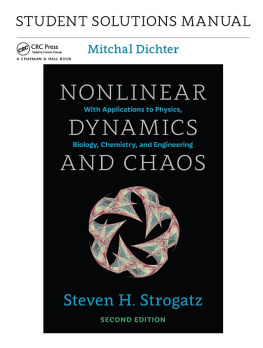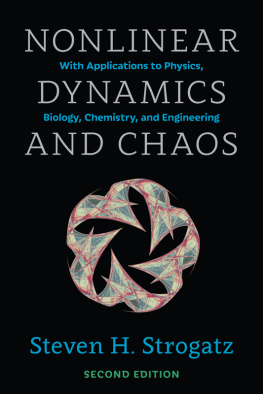Advance Praise for Chaos and Nonlinear Psychology
The years 1985-2000 witnessed a chaos revolution in the social sciences. Many of the leading participants in this important development are included in this volume.
Ralph Abraham, co-editor with Yoshisuke Ueda, The Chaos Avant-Garde(2000).
The editors of this volume have ambitions for it both large andlaudable. They bring big theoretical perspectives and methodsprincipally from nonlinear dynamical systems (NDS)to all levels of psychology: individual cognition, cultural dynamics, and clinical practice. I think they have truly succeeded. Along the way, contributors emphasize personal interdependence, the importance of stories at all levels, and some Darwinian influences that I would characterize as enlightened. There are appropriate calls to action in the face of COVID-19 and our climate crisis. Importantly, this wonderful mix of theory and practice will be accessible to those who are not yet expert in NDS.
Christopher Comer, author with Ashley Taggart of Brain, Mind and the Narrative Imagination(2021).
If we are to solve the myriad interconnected social and environmental problems that confront us, we need to take a systemic or holistic approach, but how does one do that? How does one change ones way of thinking? Chaos and Nonlinear Psychologyoffers a much-needed structure to applying a systemicnonlinearapproach to problems and situations in everyday life. Within a unified framework with six themes, the authors of each chapter guide us through a range of stories and examples. The great scientist Lynn Margulis taught us that the only way to understand biological interactions is through a systems approach. This book enlarges the field of view to include psychology and society. It is a much-needed resource as we attempt to understand ourselves and transition into a less destructive and more collaborative world.
John Feldman, filmmaker. Director of the documentary Symbiotic Earth: How Lynn Margulis rocked the boat and started a scientific revolution (2018) and coming in 2022: Regenerating Life.
Chaos and Nonlinear Psychologyis just the right text at just the right time, balanced in empirical tools, mathematics, theory, and myriad applications. Each of the editors, and the chapter authors, brings decades of dedication to their topics. Their bios and CVs can document their expertise in applying nonlinear dynamical systems (NDS) to a range of topics emanating from the core of psychology.
When you spend most of your life working to understand and apply nonlinear dynamical systems (NDS) theory, you arrive at a deep and intuitive perspective; these authors understand NDS like the backs of their hands. Similarly, they can see the limits of linear methods and reductionism as plain as the noses on their faces.
Compared to other texts on chaos and complexity in psychology over the past 30 years, this book sits at a unique, and highly accessible, cross-roads. Beyond the various branches of academic psychology, artists, physicists, psychotherapists, business consultants, and interested lay readerseach will find useful tools and insights in this book.
As such, the material is as solid as it is accessible. Ive never seen a text on NDS (including those on which Ive worked myself) that has so cleverly leveraged the transdisciplinary concepts inherent to chaos and complexity theory so effectively to provide integrity across the various chapters. Using the six core themes from the introduction (e.g., nonlinearity, emergence, patterns, models, interventions, and worldviews), they tie diverse chapter content together such that readers experience the greatest strength of NDS: ubiquity. Readers may then understand the commonalities among traditionally segregated topics like social dynamics and creativity (e.g., via emergence), or how the complex balance underlying psychophysiological health resembles that of organizational health, despite their different scales. Further, the text embeds these themes, with the relevant concepts, in editorial boxes throughout each chapter. This allows for an ongoing dialogue between the editors and the reader on the cross-cutting themes throughout the text. Finally, the material is organized according to depth and difficulty, with two clearly demarcated beginning, and intermediate, sections. This allows the reader to enjoy a smooth developmental progression, with the text boxes serving like handrails on a set of stairs. In contrast to most edited texts, which can have a bumpy and disconnected feel to them across individual stand-alone style chapters, this text is a single work that still delivers on the diverse expertise of each chapter author.

